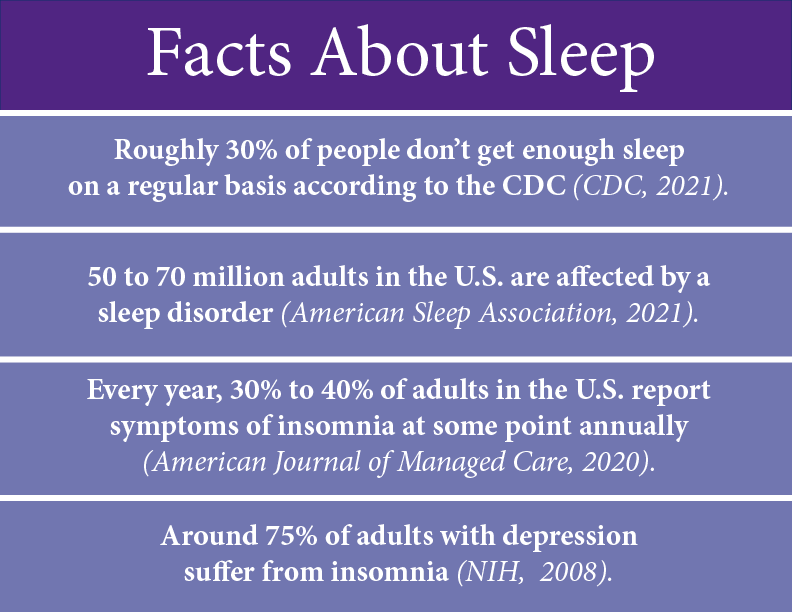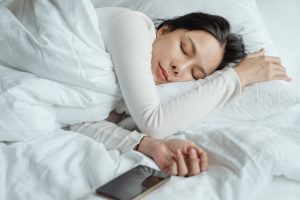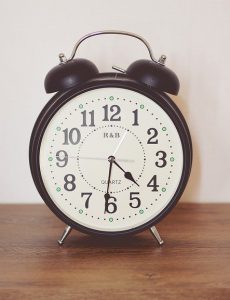Find out how not getting enough sleep can lead to some serious health consequences with an overview of the importance of each sleep stage. Plus, facts about sleep, how much sleep is needed for both adults and kids, why it matters what time you sleep, the importance of sleep schedules, and everything you need to know about napping.

Facts About Sleep Stages & Why Each Stage is Important
Getting enough sleep isn’t the only goal. You need to spend enough time in each sleep stage. There are up to five stages of sleep, but for the most part, they can be grouped into just three stages:
 Light Sleep:
Light Sleep:
After you transition into sleep, you go into a light sleep and this is the time you can easily be wakened. This stage of sleep is just as important as the others because your body processes memories and emotions, and your metabolism regulates itself. In this stage, your breathing and heart rate slightly decreases.
Facts About REM (Rapid Eye Movement) Sleep:
REM sleep is known as the dreaming stage of sleep where the body is inactive and the eyes move rapidly. But you do dream in the other stages of sleep. REM sleep is known for helping the brain to rebuild and repair. It helps with emotion regulation and memory with more blood going to the brain. The brain not only recharges but will work to get rid of unnecessary things and move other things to long-term memory. Heart rate will increase and breathing will become more irregular. If you never remember your dreams this could be a sign you are not getting enough REM sleep.
Deep Sleep:
During this stage of sleep, you are not dreaming and it’s harder for you to be woken. This stage is all about repairing the body where REM sleep is about the mind. Your body will release hormones for cellular rebuilding and repair. Tissues in the body renew and repair themselves. You also process blood sugar, the skin repairs itself, and TNF circulates which is known to be a cancer killer. This is the stage of sleep that also helps in building a strong immune system. In this stage breathing is slower, muscles are relaxed, and heart rate is typically more regular. Here are 6 Signs You Didn’t Enter A Deep Sleep Overnight, Even If You Slept 8 Hours.
Short-Term Problems from a Lack of Sleep include stress, tiredness, lack of focus/motivation, memory problems, moodiness, being easily distracted, performance problems, etc. Typically the short-term effects are mental but can turn into physical problems over time.
Facts on Sleep Deprivation
Long-Term Health Problems From a Lack of Sleep
Not getting enough sleep not only causes short-term cognitive problems but can also contribute to long-term health conditions. An ongoing lack of sleep has been closely associated with hypertension, heart attacks, and strokes, obesity, diabetes, depression, and anxiety, decreased brain function, memory loss, weakened immune system, lower fertility rates, and psychiatric disorders (Dr. Rosenberg, 2019).
A lack of sleep can elevate stress levels increasing cortisol levels and increasing blood pressure. It can lead to obesity because it impairs metabolism, causes people to emotionally eat, have unhealthy cravings, and eat more.

Many people who struggle with depression also struggle with sleep deprivation.
Many people who struggle with depression often struggle with sleep deprivation and tend to have irregular sleep cycles. They also tend to have lower levels of melatonin. Melatonin is a hormone needed for regular sleep cycles and mood regulation. Sometimes depression is actually caused by anxiety or a sleep disorder.
A good night’s sleep helps with brain functions. Therefore, sleep deprivation over time can lead to memory problems, difficulties solving problems, making decisions, and effectively regulating emotions.
Your immune system also takes a hit with a lack of sleep, and this makes you more susceptible to colds and viruses. This is because your body responds to a lack of sleep similar to how it responds to increased stress levels.
Lastly, sleep can make it hard for both men and women to conceive due to the reproductive hormones that are released while a person is sleeping.
Read more on how a lack of sleep can lead to these specific health issues here: 10 Effects of Long-Term Sleep Deprivation.
How Much Sleep Do You Need?
National Sleep Foundation guidelines advise that healthy adults need between 7 and 9 hours of sleep per night.
 Recommendations for sleep based on age from the Sleep Foundation are:
Recommendations for sleep based on age from the Sleep Foundation are:
Newborns 0-3 months need: 14-17
Infants 4-11 months need: 12-15
Toddler 1-2 years old 11-14
Preschool 3-4 years old 10-13
School-age 6-13 years old 9-11
Teen 14-17 yeard old 8-10
Adult 7-9
(Suni, 2021)
These recommendations are based on a bunch of research studies that have been evaluated and studied by experts in science and medicine.
There are ranges because the number of hours of sleep really depends on the person. It depends on their lifestyle, health, and biological needs. It’s important to pay close attention to what your body is telling you. There is a very small percentage of the population less than 3% that only needs 6 hours of sleep at night due to a rare gene.
Why Sleep Times & Schedules Matter
Unfortunately, when you go to bed also matters. In order to get enough deep sleep and REM sleep, you need to go to bed during the hours of 8 pm and midnight. If you go to bed at 3 AM you will get lighter sleep and not get the deep sleep you need. The ideal time is different for each person depending on age, life factors, and biology. However, going to sleep at roughly the same time every night and getting up at the same time every morning is super important! People with irregular sleep schedules have a harder time going to bed at night because irregular schedules disrupt sleep rhythms.
Sadly, people who work at night and sleep during the day will never get the full sleep benefits they need. Your brain and body’s circadian rhythms—which regulate everything from your sleeping patterns to your energy and hunger levels—tell your brain what kind of slumber to crave (Heid, 2017). Since the circadian rhythms have been the same for thousands of years, they can’t just change over the course of a few months or even 40 years. They are based on a biological clock located in the brain. There is a higher rate of obesity, heart attack, lower cognition, and death associated with working at night and sleeping during the day.
How to know you are getting enough sleep?
 When you sleep you should be getting a certain amount of light sleep, REM sleep, and Deep sleep. If you never remember your dreams the next day you might not be getting enough REM sleep.
When you sleep you should be getting a certain amount of light sleep, REM sleep, and Deep sleep. If you never remember your dreams the next day you might not be getting enough REM sleep.
Otherwise, it’s just a matter of paying attention to how you feel during the day. If you are dependent on caffeine you may not be getting enough sleep. If you constantly feel drowsy, sluggish, and find yourself dosing off easily then you need to work on your sleep. Also, if you are constantly hitting the snooze button and need naps during the day you probably need more sleep. Other signs of not getting enough sleep include puffy eyes, weight gain, junk food cravings, moodiness, depression, trouble concentrating, forgetfulness, headaches, IBS, low libido, fatigue, dosing off while driving, and being easily stressed.
A Fitbit for Tracking Your Sleep
I actually prefer to track my sleep with my Fitbit. With my Fitbit, I can see how many hours I slept, how much of it was REM sleep, light sleep, and deep sleep. It also gives me a score of poor, fair, good, or excellent. It might not be that accurate, but it helps me to evaluate whether I’m getting enough good sleep while also taking into account how I feel that day. I don’t necessarily think you need a Fitbit though in order to know if you are sleeping well. It’s just a nice thing to have. It definitely is helpful if you are unsure if you are getting enough REM or Deep sleep.
Facts About Naps
Are Naps Good or Bad?
Slowing down and taking time for a nap is typically a good thing. Napping is not only good for kids, but for adults too. Life can be hectic, stressful, and if you have small kids that stop you from getting the sleep you need napping is super helpful! If you are sleep-deprived napping is better than turning to energy drinks, highly caffeinated beverages, or just trying to get through the day barely keeping your eyes open. A lack of sleep can lead to mistakes at work, general moodiness, or cause a person to fall asleep behind the wheel of the car.
Research to date shows us that naps, when done the right way, can help balance hormones naturally and reduce sleepiness overall — especially the “lull” many of us experience in the afternoon — as well as improve mental and physical performance (Mednick, 2002).
 What is a Reasonable Nap Time?
What is a Reasonable Nap Time?
According to some researchers in Australia, just 7 to 10 minutes can be beneficial. However, a nap that is 15 minutes or less is said to be only beneficial for 1 to 3 hours afterward. A nap 30 minutes or longer will last several more hours and also provide increased cognition, but a person may feel a bit impaired upon waking. The best length of time for a “power nap” is said to be anywhere from 10 to 20 minutes. This will leave you feeling more alert and improve cognitive performance without feeling groggy or sluggish.
It is advised to take naps earlier in the day, as you don’t want them to interfere with getting to sleep at night. A mid-morning nap or a mid-afternoon nap are recommended. The body has a natural energy decrease around 2 pm.
When Naps are a Problem
I personally have never been much of a napper. I only nap when I’m very sleep-deprived or sick. I’m also not the type of person who can easily fall asleep when it isn’t nighttime. I do believe napping can be a good thing, but I think if you take a lot of naps it is important to pay attention to the why.
Napping because you didn’t get enough sleep because you have a kid/baby waking you up, or you have a lot of stressful work and it gives you a quick boost is great. But, if you normally find yourself tired on a regular basis, it is important to look at your diet. I personally find that if I’m feeling tired right after breakfast or lunch it has more to do with what I’m eating than anything else. If you had a sugary coffee for breakfast and some pancakes with sugary syrup and feel like napping afterward, your diet is likely why. Too much sugar is known for making people feel groggy and sluggish.
 I also think if you find yourself needing naps that are longer than 30 minutes, it is important to look at your stress levels. While napping can be a great way of handling stress, there might be something you need to change in your day-to-day life so the naps don’t get in the way of accomplishing work tasks or personal tasks. Additionally, if you are fatigued on a regular basis this could point to a potential health issue that may need to be addressed.
I also think if you find yourself needing naps that are longer than 30 minutes, it is important to look at your stress levels. While napping can be a great way of handling stress, there might be something you need to change in your day-to-day life so the naps don’t get in the way of accomplishing work tasks or personal tasks. Additionally, if you are fatigued on a regular basis this could point to a potential health issue that may need to be addressed.
How to take an Effective Nap
Make sure you are as comfortable as can be, consider the temperature of the room and how dark it needs to be. Most people tend to sleep better in cooler temperatures and sleep better with a blanket. Lastly, make sure to set a timer to get the right amount of sleep.
We All Struggle with Sleep at Some Point in Our Lives!
How About Ideas on How to Sleep Better & What to do When You Can’t Sleep?
My next blog will go through analyzing sleep problems, and ideas to help with both random sleep problems and ongoing sleep problems. Along with improving sleep schedules.
View All Wellness Lifestyle Blog Posts:
What It Means To Live A Wellness Lifestyle & Why It Matters
How an Unhealthy Spine Can Cause Numerous Problems
How Relationships Influence Our Health (in multiple ways) & Our Success
Managing 3 Stages of Stress (Conscious, Hidden Stress & Preventing It)
Cardio vs HIIT – Find out the Benefits of Both!
How Exercise Can Be Natural & Fun
Nature Heals the Soul, Calms the Mind & Restores the Body
Everything You Need to Know About Supplements
How to Sleep Better & What to do When You Can’t Sleep
How to Increase Water Intake & Choosing Clean Drinking Water
Key to Wellness: Listening to Your Mind, Body, Spirit/Soul
Addicted to Your Phone? Ideas for Spending Less Time on Your Phone
Resources:
Dr. Rosenberg, Carl. (2019, April 8). Sleep Health Solutions/10 Effects of Long-Term Sleep Deprivation. Retrieved from: https://www.sleephealthsolutionsohio.com/blog/10-effects-of-long-term-sleep-deprivation/
Suni, Eric. (2021, March 10). Sleep Foundation/How Much Sleep Do We Really Need?. Retrieved from: https://www.sleepfoundation.org/how-sleep-works/how-much-sleep-do-we-really need#:~:text=National%20Sleep%20Foundation%20guidelines1,to%208%20hours%20per%20night
Mednick, Sara C., Nakayama, Ken., Cantero, Jose L., Atienza, Mercedes., Levin A, Alicia., Pathak, Neha., Stickgold, Robert. (2002, July). NIH/The restorative effect of naps on perceptual deterioration. Retrieved from: https://pubmed.ncbi.nlm.nih.gov/12032542/
Heid, Markham. (2017, April 27). TIME/What’s the Best Time to Sleep. Retrieved from: https://time.com/3183183/best-time-to-sleep/
Levy, Jillian. (2017, June 26). Dr. Axe/Is Napping Good or Bad for You? The Science Behind a Power Nap. Retrieved from: https://draxe.com/health/power-nap/
American Sleep Association/Stages of Sleep: The Sleep Cycle. Retrieved from: https://www.sleepassociation.org/about-sleep/stages-of-sleep/
Kosecki, Danielle. (2018, September 19). FitBit/REM, Light, Deep: How Much of Each Stage of Sleep Are You Getting?. Retrieved from: https://blog.fitbit.com/sleep-stages-explained/
CDC/1 in 3 adults don’t get enough sleep. (2016, February 18). Retrieved from: https://www.cdc.gov/media/releases/2016/p0215-enough-sleep.html#:~:text=More%20than%20a%20third%20of,Morbidity%20and%20Mortality%20Weekly%20Report
American Sleep Association/Sleep Statistics. Retrieved from: https://www.sleepassociation.org/about-sleep/sleep-statistics/
AJMC/ Insomnia Overview: Epidemiology, Pathophysiology, Diagnosis and Monitoring, and Nonpharmacologic Therapy. Retrieved from: https://www.ajmc.com/view/insomnia-overview-epidemiology-pathophysiology-diagnosis-and-monitoring-and-nonpharmacologic-therapy
Nutt, David. Wilson, Sue. Paterson, Louise. (2008). PubMed.org/Sleep disorders as core symptoms of depression. Retrieved from: https://pubmed.ncbi.nlm.nih.gov/18979946/
I have a Wellness Coach Certificate, I'm an entrepreneur, an innovator, writer, and artist. My expertise includes over 7 years of marketing, research, and developing content for holistic health businesses. Plus, my own personal journey of becoming chronically sick: understanding what went wrong, and finding a way to heal and live a healthier life. I have a passion for wellness with a wealth of knowledge surrounding: wellness, flaws in healthcare, root causes for chronic illnesses, and alternative treatments.


